At Last Call, a staffer learns to enjoy fine dining a bit differently—and makes some new friends.
When I entered EC1816, the first sensation I noted was the warmth, a cozy blanket of oven heat. The theme of the evening was “a culinary journey throughout the four seasons,” and as requested, I had dressed the part: A short sundress and sandals meant to evoke some hodgepodge of summer and spring. As Last Call co-founder and dual English/Cell Biology major Cindy Cao (BC ’23) ushered me into the living room, that comfortable warmth provided me a respite from the bitter cold outside, yes; but it was also a constant reminder of the endlessly-busy and remarkably passionate Columbia students rushing in and out of the kitchen all night, devoted to crafting what would become not just a dinner, but an unforgettable experience.
Last Call, a group of 11 seniors who comprise “a community of people who care about feeding others,” was founded by Cindy Cao and David Jung (Political Science/Sociology, CC ’23). The two were inspired by a similar project founded by a friend of David’s at the University of Michigan, and after assembling a larger group of their friends, they held a wildly successful launch event. The dinner I attended was their first attempt at a more intimate gathering—and, as you will gather from my retelling below, it was a hit. As second-semester seniors, the 11 chefs’ participation in Last Call is their final hurrah in undergrad as well as a deeply personal passion project to pursue before graduating. Recounting where the name of the club originated in a post-dinner interview, Cindy told me: “I had this memory of when I first learned about how a bar does ‘last call’ for drinks, so I thought, what if we named it Last Call as a reminder that our time with our friends is fleeting? Why not just show up to a new experience with possible strangers and just enjoy your time over food?”
As I settled into conversation with my table-mates, our hosts began dotting the table with additional decorations, building anticipation as much as they were photo ops. I had just gotten to know the girl to my left when a member of Last Call ordered us to switch places with someone else at the table, but the intrusion was a welcome one. As they had told us at the beginning of the dinner, the night was a social experiment and a fine dining experience in equal measure. As we exchanged names and ooh-aahed over the menu, the first course was placed on the table, a whipped ricotta crostini with flavors of yuzu and basil. According to Mikey Massaneh (CC ’23), an Economics and Mathematics major, the crostini was a take on the classic starter incorporating “Asian-inspired flavors,” a theme that would recur throughout the night. As Cindy and other co-founder David Jung (Political Science and Sociology) would later tell me, Last Call is, in part, an exercise in introducing traditional Asian flavors to modern haute cuisine.
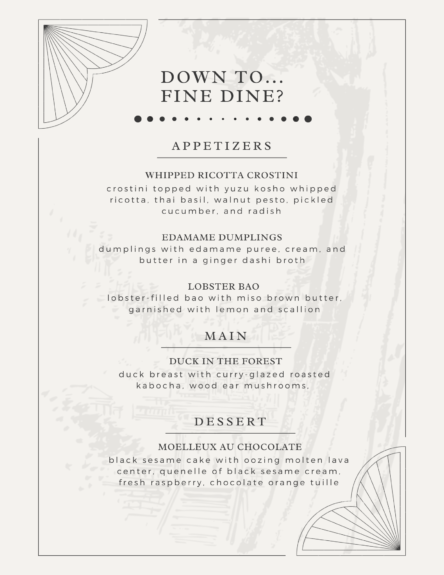
The menu for the night 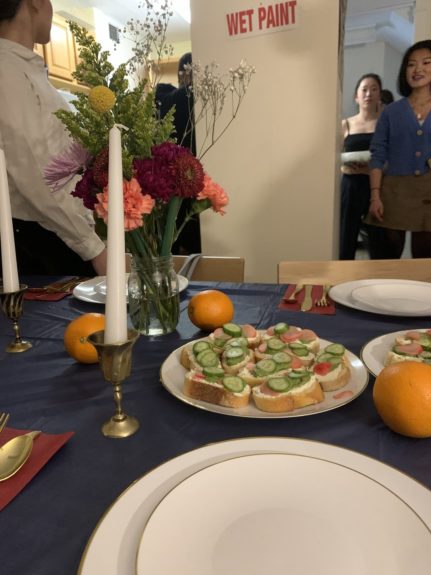
Whipped crostini set on the table
The next two dishes were, like the crostini, hard to keep from wolfing down. Funnily enough, both seemed tailored to me, in remarkably different ways. The edamame dumplings were one of my favorite dishes of the night, despite the fact that I can barely stand to eat the individual salted beans. Their perfect texture in the dumpling, along with a delightfully tender dough and flavorful broth, made a legume that I actively avoid in my day-to-day life the star of a dish I would happily eat again (and again, and again). Anna Szeto (SEAS ’23), a Computer Science and Operations Research major, tested “new recipes and techniques” to perfect the crystal dumpling, “[making] the chewy translucent dumpling skins from scratch and experimenting with flavors that highlighted the star ingredient.” A fitting transition between the lightest appetizer and the forthcoming heaviest as well as an excellent dish in their own right, these dumplings tasted as much like spring as you could possibly expect.
The lobster bao, which immediately followed, was a dish after my own heart. I am a Cape Codder, born and raised (for the most part), and I firmly believe that nothing completes a meal like lobster smothered in butter. Lindsay Kornguth (CC ’23), a Computer Science major and the progenitor of this dish, describes it as follows: “I drew inspiration for the first from the classic Maine Lobster Roll—I envisioned a bite-sized, Asian-inspired version of this popular street food. Instead of the traditional butter-poached lobster, I sauteed the fresh seafood in a decadent browned butter miso sauce, and served it on top of homemade bao buns with lettuce and sliced lemon.” As a bit of a lobster connoisseur, I have often found myself disappointed by heavy, New England-style lobster rolls stuffed with heavy sauces and toppings that suffocate the already-rich seafood. Lindsay’s light, slightly tangy take on this dish was delightfully refreshing, and I preferred it to most other lobster-based dishes I’ve had in New York. It’s worth noting that Lindsay also created a vegetarian version of the bao with mushrooms, which was a hit with the table; I did not try them myself, but I’m sure they were similarly satisfying.
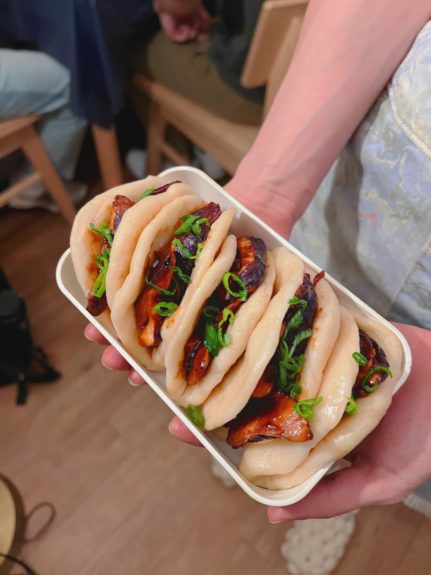
Lobster and mushroom bao
With that, it was time for the main course: A duck dish, with a side of curry-glazed roasted kabocha squash and wood-ear mushroom risotto. As David told us before we dug in, the dish was meant to represent the image of a duck exploring an autumn forest, but he later explained to me that the choice to serve duck was informed by more than just this pleasant picture. Having lived in Taegu, an area with “a lot of duck,” David’s mother and grandmother had often cooked it for him, and David has since continued the tradition for his friends. Just like the other dishes, this main course incorporated cultural fusion, achieving a balance between flavors that don’t often find each other on the same plate. In David’s words, the dish was an exercise in “spinning new American and European styles, and interweaving it with Asian experiences. Instead of doing a traditional mushroom risotto, we decided to make a shiitake mushroom and wood ear mushroom risotto, which is a very Asian-inspired one, and then we had the duck cooked traditionally as a European pan roast. On top of that, we had a hoisin sauce, and then the last component was like a kabocha squash, and then we kind of used a red curry sauce that Mikey’s family really enjoys.” Aside from the technical skill evident in the cooking of each individual element, the dish encompassed nearly every element of what makes Last Call’s fine dining experiences unique—the creative Asian-style fusion, the sharing of cultures and cooking traditions—and I could not have imagined a way to improve it. Bravo!
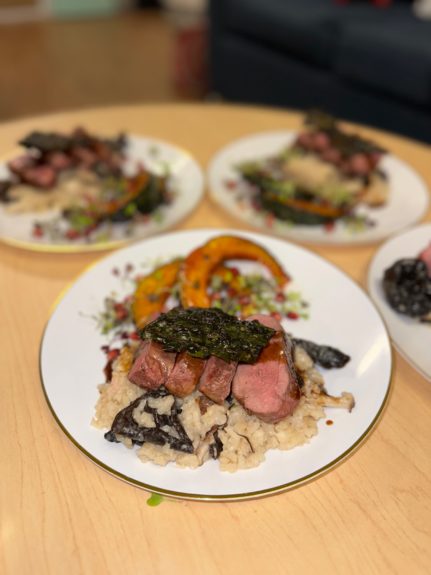
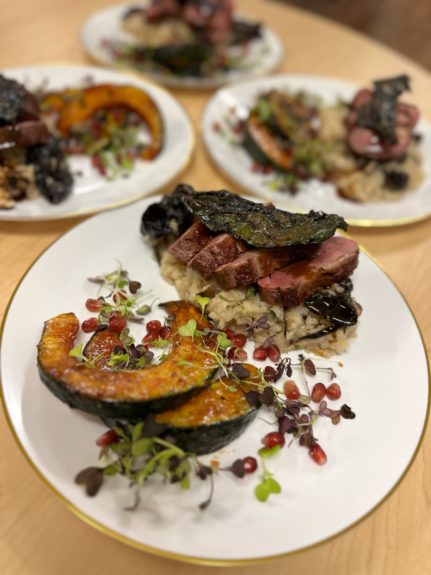
The duck dish 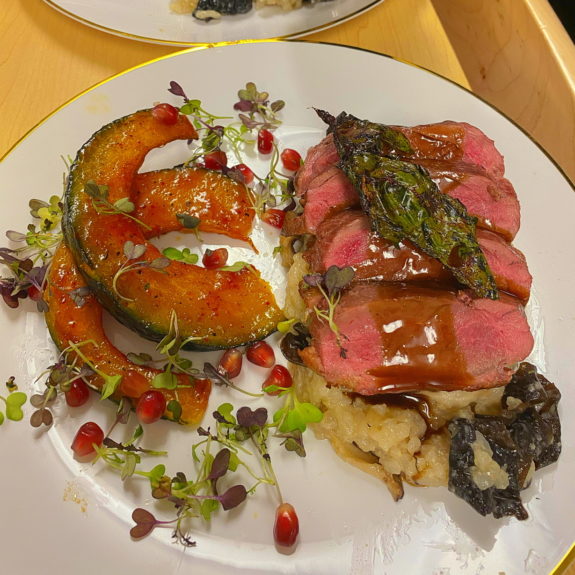
The night wasn’t over yet. No meal is complete without a hearty dessert, and the chefs at Last Call simply blew me away with their last dish, their “winter” in the journey through the four seasons. Cindy Cao, aforementioned hostess, told me, “I thought about doing a lava cake, but [I wanted to include] black sesame because black sesame is a very wintery and soothing flavor. You often find it in Taiwanese or Chinese desserts, like in soups. It’s very warm, a very childhood thing—on a rainy day, you’ve gotta have black sesame soup.” In the end, amateur French pastry chef Cindy combined two recipes, “one from Sally’s Baking Addiction and then another from a very Asian style website. This was the best one that came out of the testing, and that was the one that you had!” I am a novice baker with a terrible sweet tooth, and I can count this black sesame lava cake among some of the best desserts I’ve eaten (sorry, Ferris). The flavors played beautifully, and it truly did feel the most on-theme of any of the dishes. It was also quite satisfying to dig into.
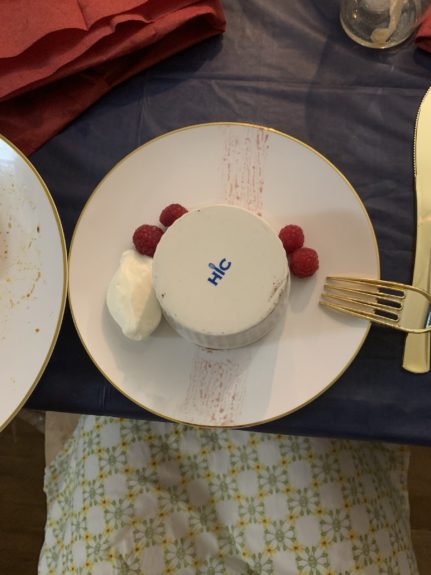
Lava cake in ramekin 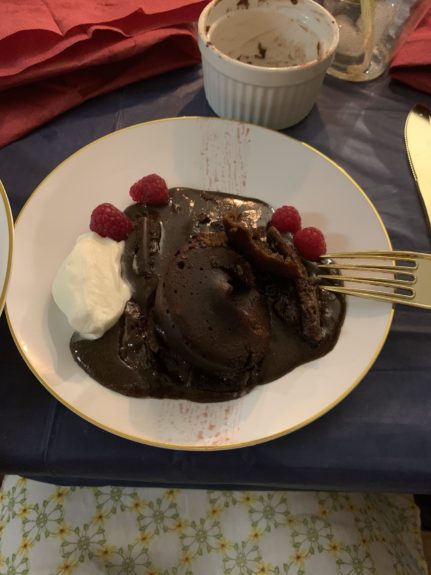
Lava cake, dug into
Any discussion of a fine dining experience at Last Call needs to include its masterful mixology. Over the course of the night, we could choose two drinks (one alcoholic, one non-alcoholic) from the spread of four that acted as a centerpiece for the table. Of those four, I chose “Peachy Blossom Breeze” and “Cocoa Boba Bliss,” but my newfound friends offered me sips of the drinks I didn’t order. All were fantastic additions to the courses as well as stunners in their own right. My favorite was the peachy blossom breeze, likely because I have a penchant for anything tasting authentically peachy, but the sour “Golden Osmanthus Sipper” was also a standout for its delicate balance of bright flavors. On the boba-themed drink, which was the most commonly ordered by a significant margin, its inventor Hugo Lai (Financial Economics, CC ’23) said: “This chocolate boba cocktail is a delightful twist on a classic Taiwanese drink and a true treat for the senses. The boba pearls added a fun and playful element to the drink, and their chewy texture perfectly complemented the smoothness of the Irish cream.” A delicious addition to the dessert course and a drink I would pay good money for in a real bar, the boba cocktail was a creative take on traditional Irish cream cocktails.
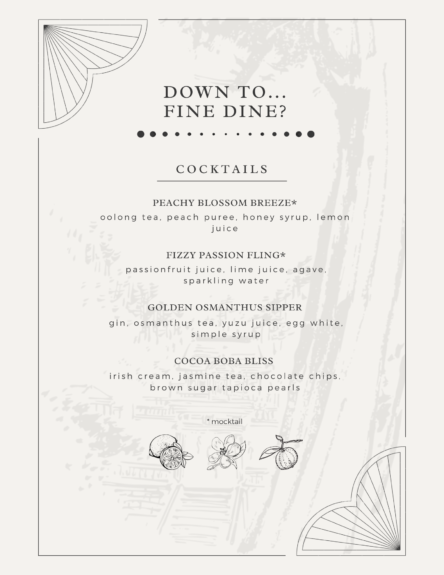
Drink menu 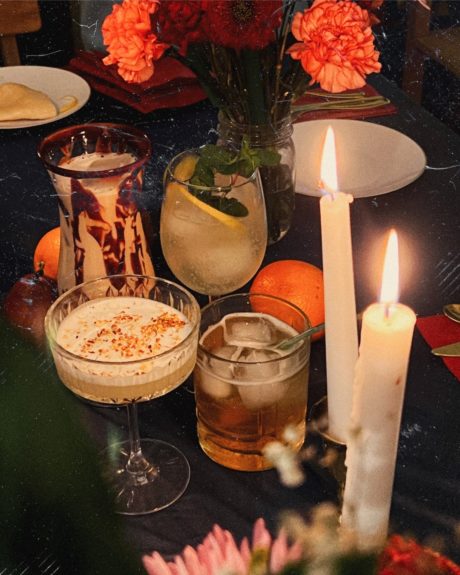
Drink centerpiece
At the end of my night with Last Call, I went home feeling delightfully full and dreamed for many hours of that perfectly-roasted duck. The most satisfying conclusion the evening left me with, however, was the fact that I had enjoyed this five-course dinner (plus drinks!) for only $40, just barely enough to cover the cost of ingredients and equipment. Cindy and David told me during our interview that the cost of entry was meant only to sustain the chefs at Last Call, and that accessibility in fine dining was one of the most important parts of their mission. “If we had to encapsulate our mission as a group, it’s about making an accessible fine dining experience with the sociability of a college party,” David told me. I can say on good authority that Last Call is nailing it, on all accounts.
Please go follow the talented people at CU Last Call on Instagram here. Also, if you are a) passionate about cooking, baking, or mixology and b) interested in sustaining the mission of Last Call as described here, reach out to the Instagram account via dm. David and Cindy are looking for underclassmen to carry the torch after this spring!
Images via Victoria Melkonyan and Cindy Cao


 0 Comments
0 Comments